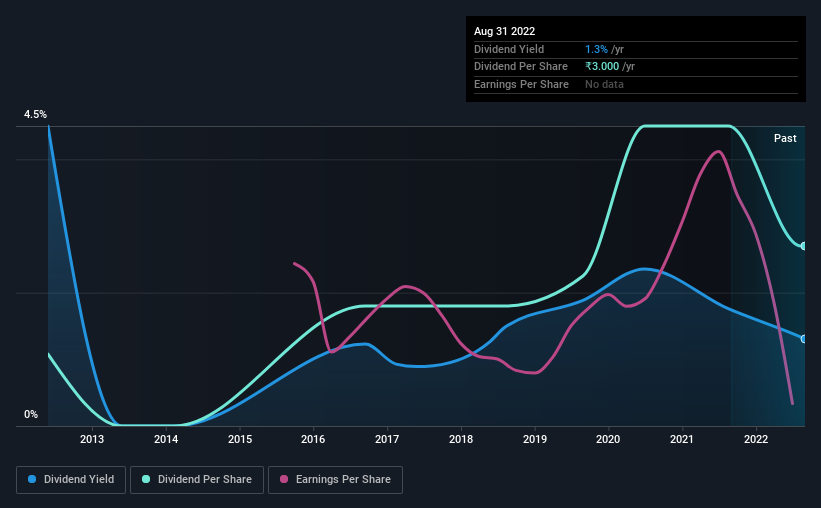- India
- /
- Basic Materials
- /
- NSEI:APCL
Anjani Portland Cement (NSE:APCL) Will Pay A Smaller Dividend Than Last Year

Anjani Portland Cement Limited (NSE:APCL) is reducing its dividend from last year's comparable payment to ₹3.00 on the 16th of October. This means the annual payment is 1.3% of the current stock price, which is above the average for the industry.
See our latest analysis for Anjani Portland Cement
Anjani Portland Cement Is Paying Out More Than It Is Earning
Impressive dividend yields are good, but this doesn't matter much if the payments can't be sustained. Prior to this announcement, the company was paying out 100% of what it was earning, however the dividend was quite comfortably covered by free cash flows at a cash payout ratio of only 8.3%. Given that the dividend is a cash outflow, we think that cash is more important than accounting measures of profit when assessing the dividend, so this is a mitigating factor.
If the company can't turn things around, EPS could fall by 29.8% over the next year. Assuming the dividend continues along recent trends, we believe the payout ratio could reach 176%, which could put the dividend under pressure if earnings don't start to improve.

Dividend Volatility
The company's dividend history has been marked by instability, with at least one cut in the last 10 years. Since 2012, the annual payment back then was ₹1.20, compared to the most recent full-year payment of ₹3.00. This implies that the company grew its distributions at a yearly rate of about 9.6% over that duration. We like to see dividends have grown at a reasonable rate, but with at least one substantial cut in the payments, we're not certain this dividend stock would be ideal for someone intending to live on the income.
The Dividend Has Limited Growth Potential
Given that the dividend has been cut in the past, we need to check if earnings are growing and if that might lead to stronger dividends in the future. Anjani Portland Cement's EPS has fallen by approximately 30% per year during the past five years. A sharp decline in earnings per share is not great from from a dividend perspective. Even conservative payout ratios can come under pressure if earnings fall far enough.
The Dividend Could Prove To Be Unreliable
In summary, dividends being cut isn't ideal, however it can bring the payment into a more sustainable range. The company is generating plenty of cash, which could maintain the dividend for a while, but the track record hasn't been great. We don't think Anjani Portland Cement is a great stock to add to your portfolio if income is your focus.
Companies possessing a stable dividend policy will likely enjoy greater investor interest than those suffering from a more inconsistent approach. However, there are other things to consider for investors when analysing stock performance. To that end, Anjani Portland Cement has 4 warning signs (and 1 which can't be ignored) we think you should know about. Looking for more high-yielding dividend ideas? Try our collection of strong dividend payers.
New: Manage All Your Stock Portfolios in One Place
We've created the ultimate portfolio companion for stock investors, and it's free.
• Connect an unlimited number of Portfolios and see your total in one currency
• Be alerted to new Warning Signs or Risks via email or mobile
• Track the Fair Value of your stocks
Have feedback on this article? Concerned about the content? Get in touch with us directly. Alternatively, email editorial-team (at) simplywallst.com.
This article by Simply Wall St is general in nature. We provide commentary based on historical data and analyst forecasts only using an unbiased methodology and our articles are not intended to be financial advice. It does not constitute a recommendation to buy or sell any stock, and does not take account of your objectives, or your financial situation. We aim to bring you long-term focused analysis driven by fundamental data. Note that our analysis may not factor in the latest price-sensitive company announcements or qualitative material. Simply Wall St has no position in any stocks mentioned.
About NSEI:APCL
Slight and slightly overvalued.
Similar Companies
Market Insights
Community Narratives



